For many, the dream of owning a dog is tempered by the reality of allergies. The thought of sneezes, itchy eyes, and wheezing can be a significant deterrent. This is where the appeal of “hypoallergenic” dogs shines through. But what exactly makes a dog breed suitable for allergy sufferers, and what are the best small breeds that fit this description? At Dog Care Story, we’re dedicated to providing you with accurate, expert-backed information to help you find the perfect canine companion.
While the term “hypoallergenic” can be misleading, as no dog is entirely allergen-free, certain breeds are known to produce fewer allergens, making them a better choice for individuals with sensitivities. These dogs typically shed less, meaning fewer dander-carrying hairs are released into your home. This guide focuses on small dogs that don’t shed and are hypoallergenic, offering insights into their unique characteristics, care needs, and suitability as pets.
Understanding Hypoallergenic Dogs
The reality is that all dogs produce allergens, primarily found in their dander (dead skin flakes), saliva, and urine. However, hypoallergenic dogs have been selectively bred to minimize the amount of dander they produce and shed. This doesn’t mean they are allergen-free, but the reduction in airborne dander can significantly lessen allergic reactions for many people.
When considering a hypoallergenic breed, especially one of a small size that doesn’t shed, it’s essential to remember that individual reactions can vary. Some people might still experience symptoms, even with these breeds. The key is finding a breed that produces less of the specific proteins that trigger your allergies. For those specifically seeking companions of this nature, exploring small and medium dogs that don’t shed is a great starting point.
Top Small, Hypoallergenic, Low-Shedding Dog Breeds
Finding the perfect small dog that ticks the boxes for being hypoallergenic and low-shedding can feel like a quest. Fortunately, many breeds fit this description, offering companionship without the excessive dander.
1. Poodle (Toy and Miniature)
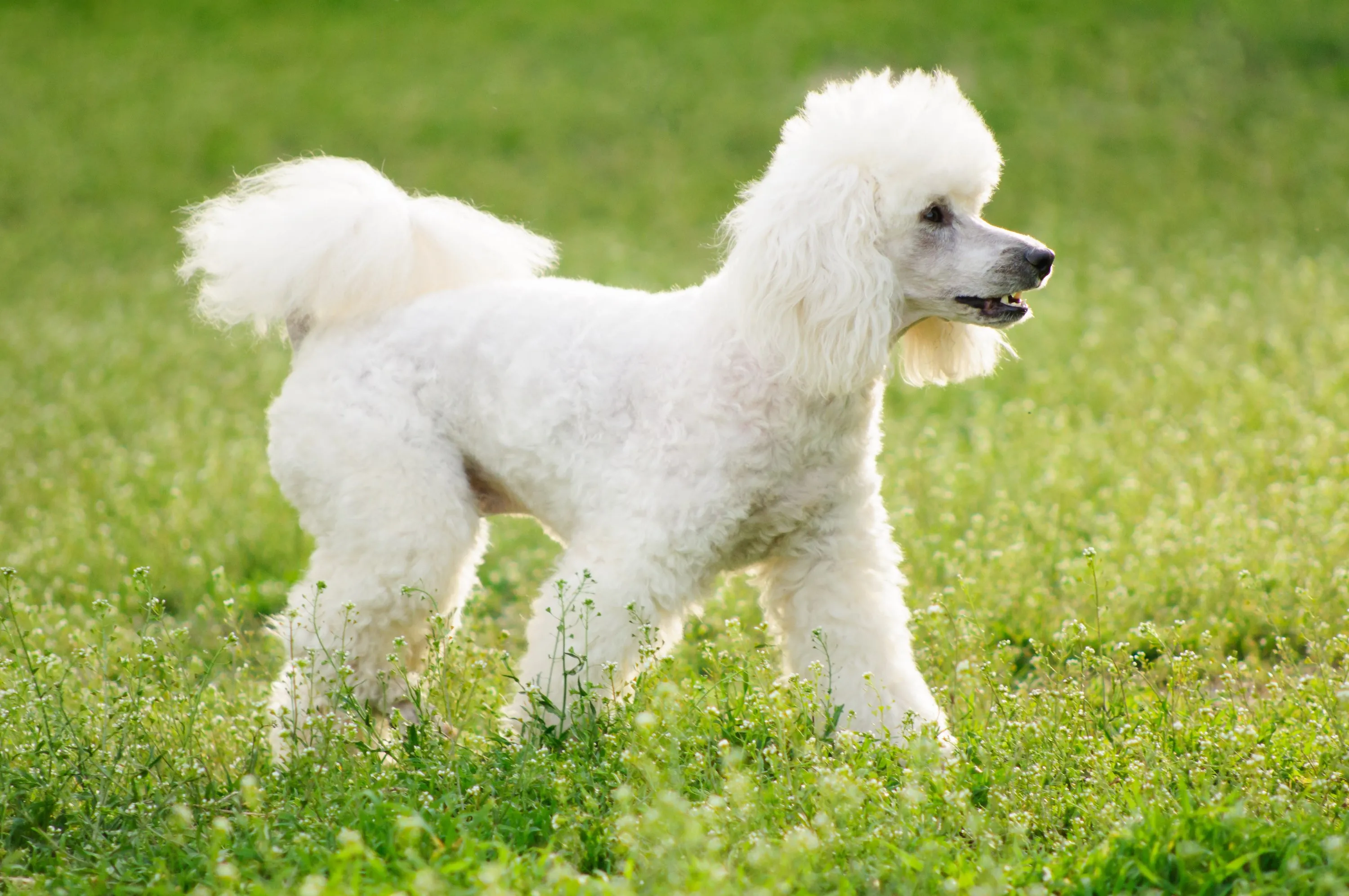 A white Toy Poodle with a neatly groomed coatThe Poodle, in its Toy and Miniature varieties, is a perennial favorite for allergy sufferers. These intelligent dogs boast a curly, dense coat that traps dander and loose hair, preventing it from spreading throughout the home. While they don’t shed much, their coat requires regular, professional grooming to prevent matting and tangles. Their high intelligence also makes them highly trainable, a bonus for any pet owner. If you’re looking for small size dogs that don’t shed, the Toy and Miniature Poodle are excellent contenders.
A white Toy Poodle with a neatly groomed coatThe Poodle, in its Toy and Miniature varieties, is a perennial favorite for allergy sufferers. These intelligent dogs boast a curly, dense coat that traps dander and loose hair, preventing it from spreading throughout the home. While they don’t shed much, their coat requires regular, professional grooming to prevent matting and tangles. Their high intelligence also makes them highly trainable, a bonus for any pet owner. If you’re looking for small size dogs that don’t shed, the Toy and Miniature Poodle are excellent contenders.
2. Yorkshire Terrier
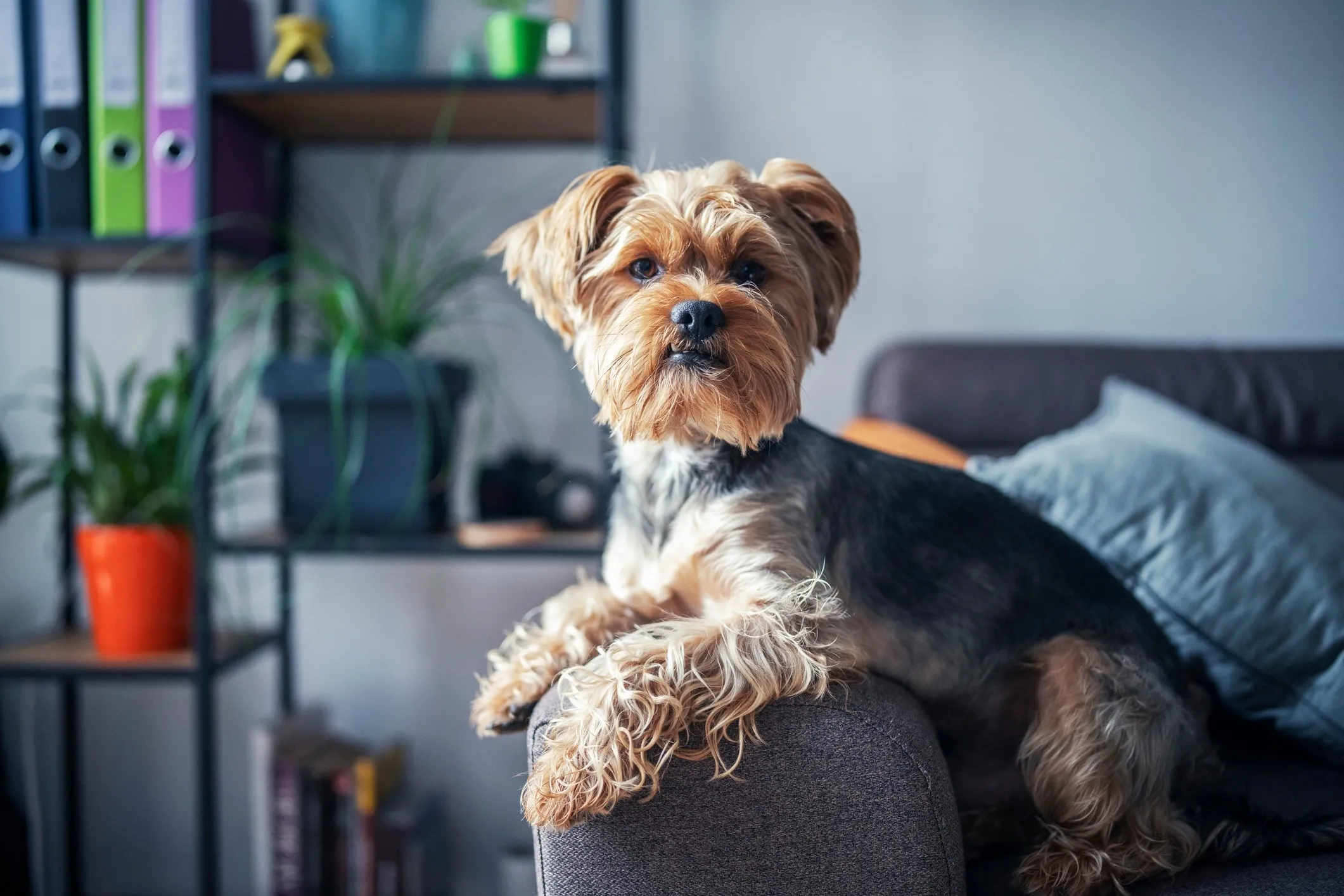 A close-up of a Yorkshire Terrier with its characteristic silky blue and tan coatYorkshire Terriers, often called “Yorkies,” are small dogs with a big personality. Their fine, silky hair is more akin to human hair than traditional dog fur, and it sheds minimally. This makes them a popular choice for those with dog allergies. Yorkies are affectionate and adaptable, making them well-suited for apartment living. However, their coat needs consistent brushing to prevent tangles and maintain its healthy appearance.
A close-up of a Yorkshire Terrier with its characteristic silky blue and tan coatYorkshire Terriers, often called “Yorkies,” are small dogs with a big personality. Their fine, silky hair is more akin to human hair than traditional dog fur, and it sheds minimally. This makes them a popular choice for those with dog allergies. Yorkies are affectionate and adaptable, making them well-suited for apartment living. However, their coat needs consistent brushing to prevent tangles and maintain its healthy appearance.
3. Shih Tzu
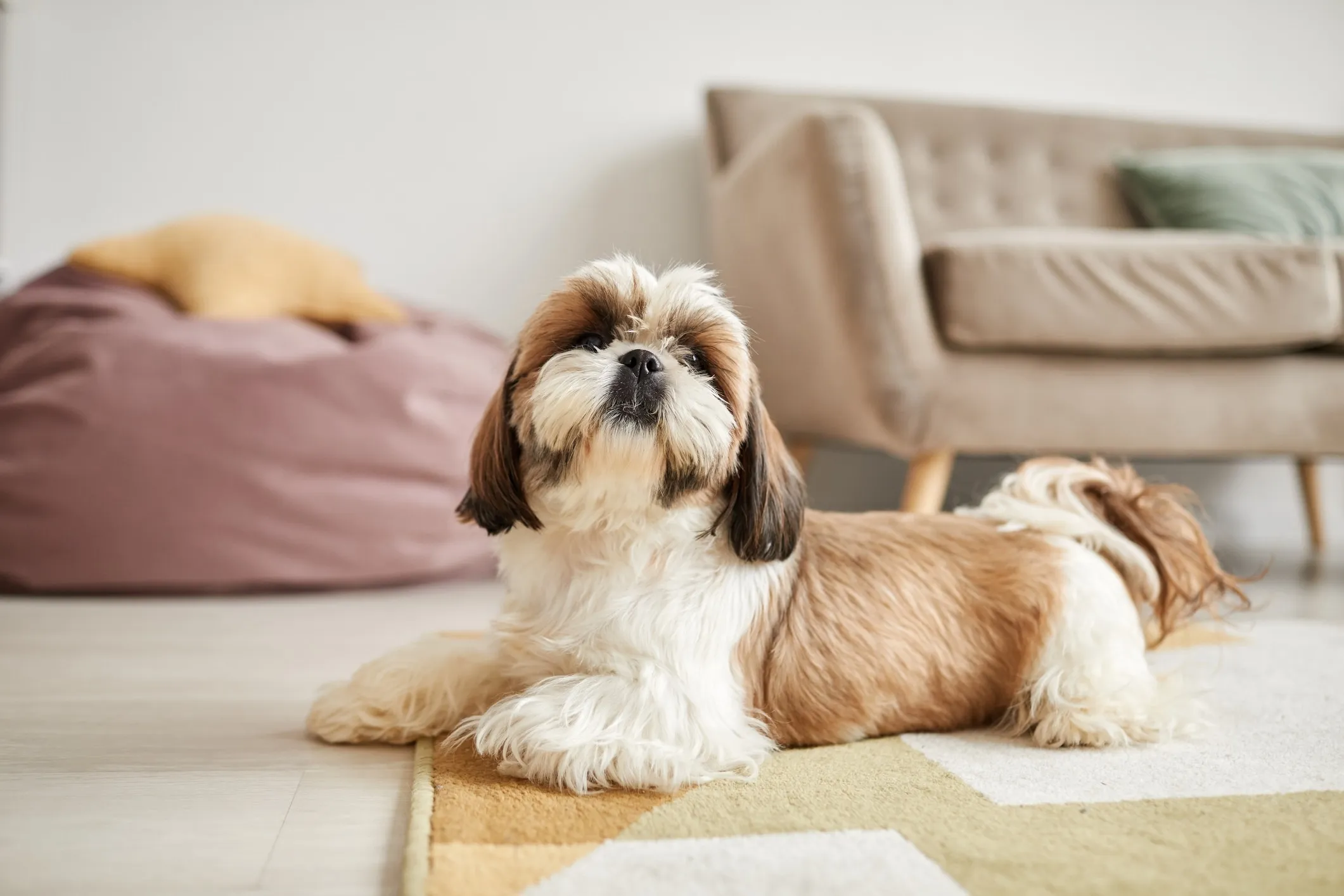 A Shih Tzu with a long, flowing coat resting comfortablyThe Shih Tzu is an ancient companion breed known for its friendly temperament and beautiful, long coat. This coat is considered hypoallergenic because it sheds very little. While their hair can grow quite long, regular grooming, including daily brushing, is crucial to prevent matting. Shih Tzus are generally well-behaved and enjoy being close to their families, making them ideal lap dogs. Be mindful of their brachycephalic (flat-faced) structure, which can lead to breathing difficulties and overheating in warmer climates.
A Shih Tzu with a long, flowing coat resting comfortablyThe Shih Tzu is an ancient companion breed known for its friendly temperament and beautiful, long coat. This coat is considered hypoallergenic because it sheds very little. While their hair can grow quite long, regular grooming, including daily brushing, is crucial to prevent matting. Shih Tzus are generally well-behaved and enjoy being close to their families, making them ideal lap dogs. Be mindful of their brachycephalic (flat-faced) structure, which can lead to breathing difficulties and overheating in warmer climates.
4. Bichon Frise
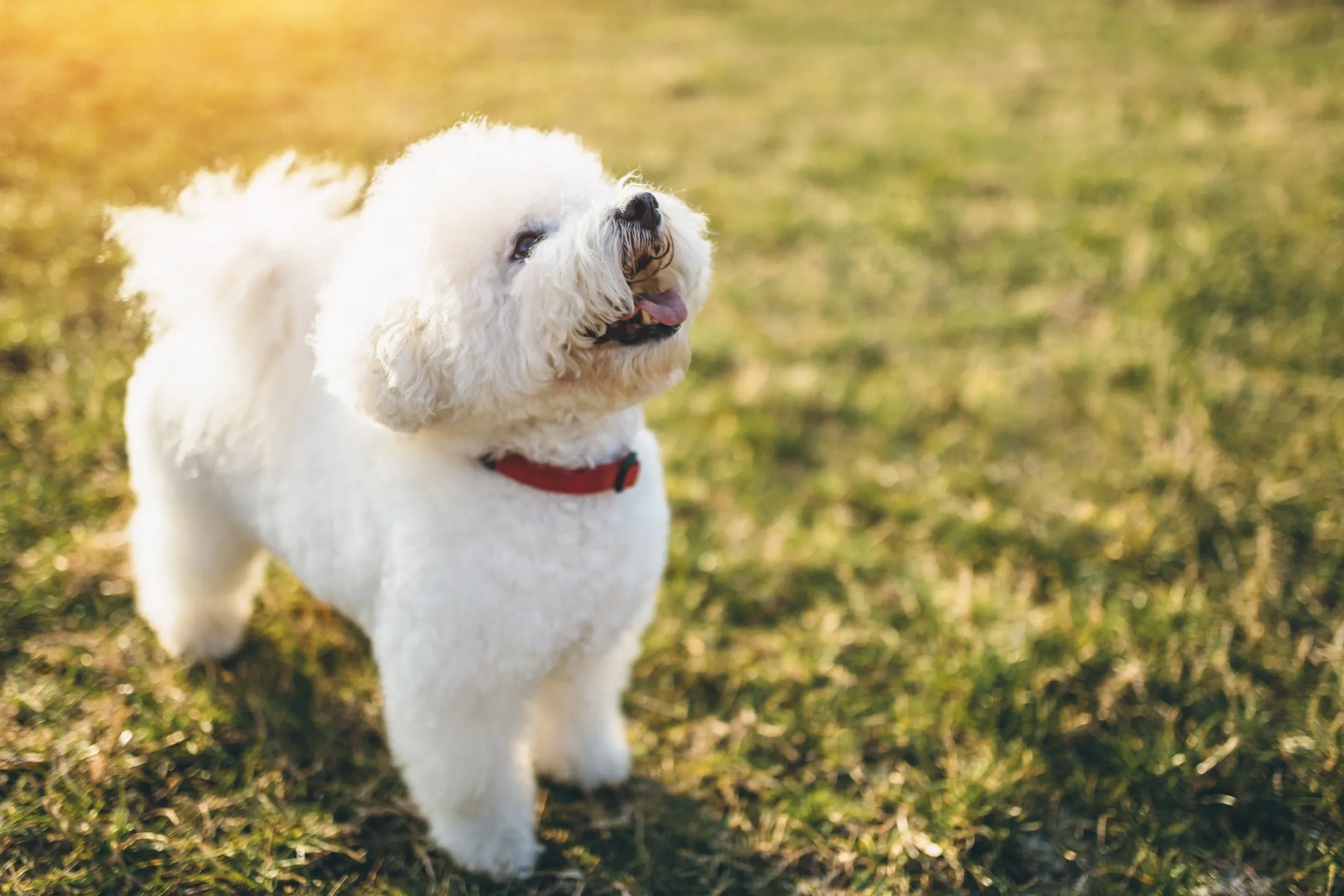 A fluffy white Bichon Frise looking alert and happyThe Bichon Frise is a small, cheerful dog with a distinctive white, curly coat that sheds very little. Their coat is known for trapping dander and allergens close to the skin. This breed is highly trainable, playful, and affectionate, making them wonderful family pets. Regular grooming, including professional clipping and daily brushing, is essential to keep their coat clean and prevent matting. Their energetic nature means they also benefit from daily exercise.
A fluffy white Bichon Frise looking alert and happyThe Bichon Frise is a small, cheerful dog with a distinctive white, curly coat that sheds very little. Their coat is known for trapping dander and allergens close to the skin. This breed is highly trainable, playful, and affectionate, making them wonderful family pets. Regular grooming, including professional clipping and daily brushing, is essential to keep their coat clean and prevent matting. Their energetic nature means they also benefit from daily exercise.
5. Maltese
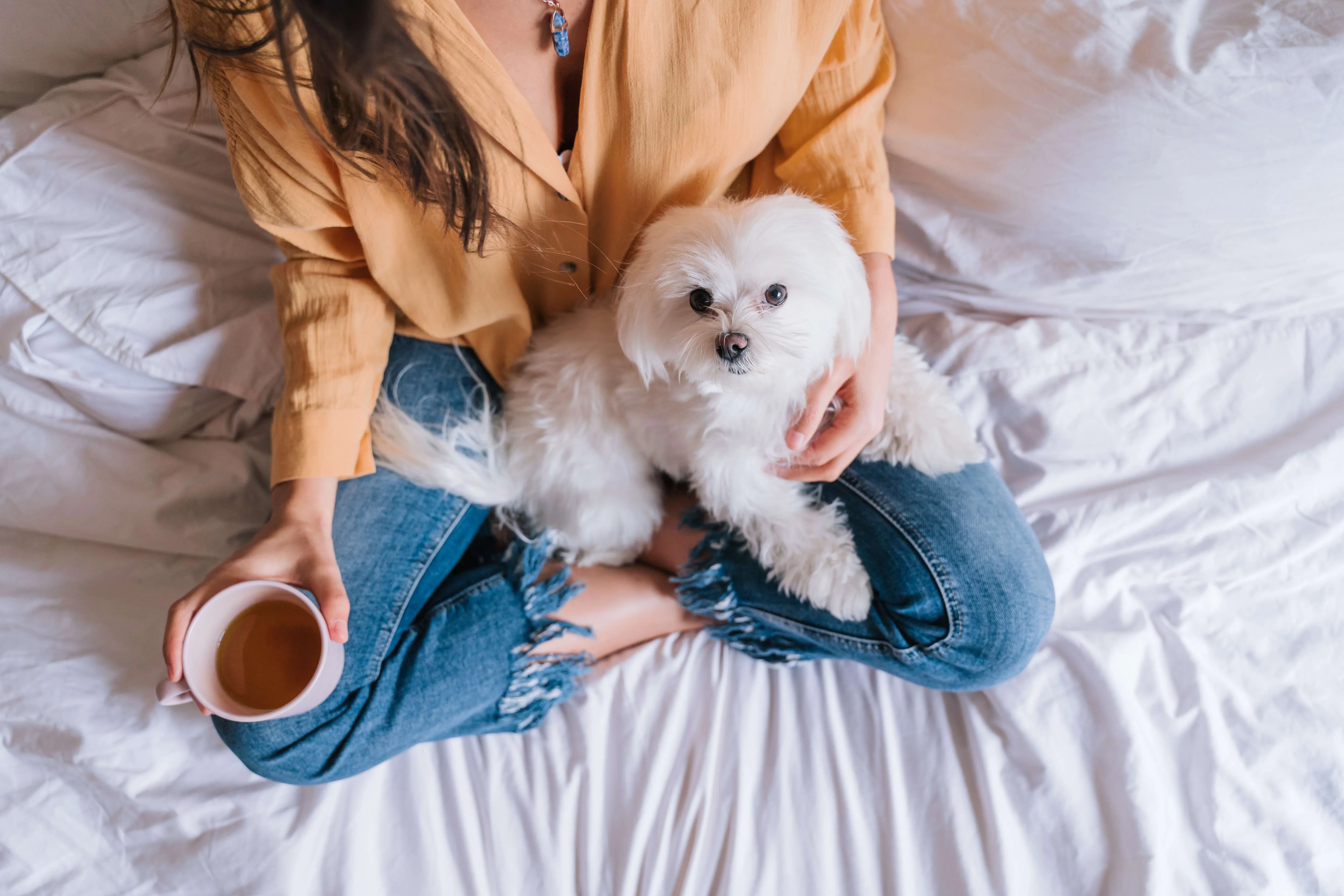 A pristine white Maltese dog with a long, flowing coatThe Maltese is a small, elegant dog with a striking long, white coat that is virtually non-shedding. Their hair is more like silk and produces minimal dander, making them a top choice for allergy sufferers. Maltese are known for their affectionate and playful nature. However, their beautiful coat requires daily grooming and regular professional attention to prevent tangles and keep it looking its best. Many owners opt for a shorter “puppy cut” for easier maintenance.
A pristine white Maltese dog with a long, flowing coatThe Maltese is a small, elegant dog with a striking long, white coat that is virtually non-shedding. Their hair is more like silk and produces minimal dander, making them a top choice for allergy sufferers. Maltese are known for their affectionate and playful nature. However, their beautiful coat requires daily grooming and regular professional attention to prevent tangles and keep it looking its best. Many owners opt for a shorter “puppy cut” for easier maintenance.
6. Bolognese
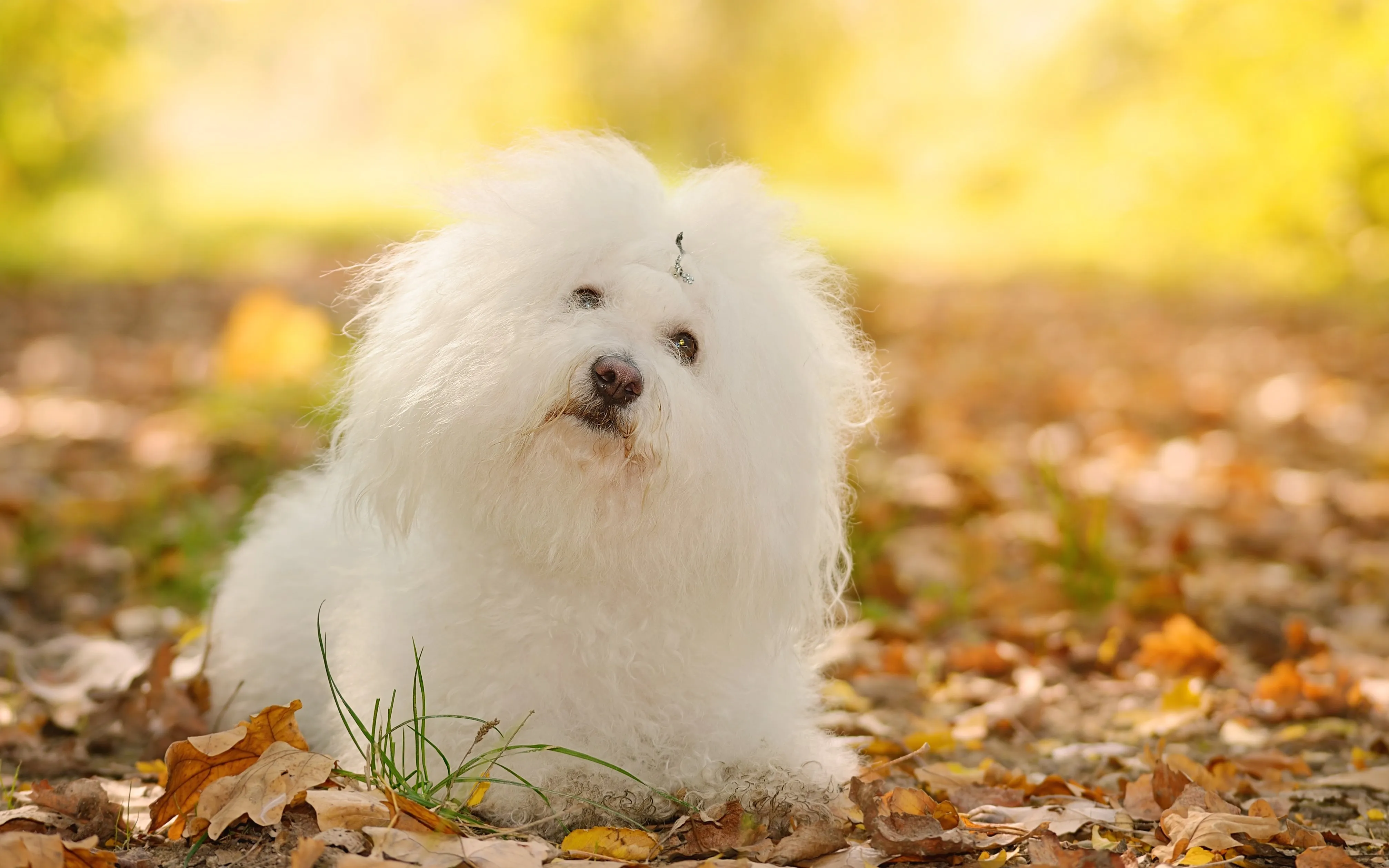 A white Bolognese dog with a fluffy, cotton-like coatOriginating from Italy, the Bolognese is a small, charming dog characterized by its long, fluffy white coat. This coat is low-shedding and hypoallergenic, making the breed suitable for those with allergies. Bolognese dogs are known for their playful, easygoing nature and are generally good with children and other pets. They thrive on companionship and can adapt well to various living situations. Regular grooming is necessary to maintain their distinctive coat.
A white Bolognese dog with a fluffy, cotton-like coatOriginating from Italy, the Bolognese is a small, charming dog characterized by its long, fluffy white coat. This coat is low-shedding and hypoallergenic, making the breed suitable for those with allergies. Bolognese dogs are known for their playful, easygoing nature and are generally good with children and other pets. They thrive on companionship and can adapt well to various living situations. Regular grooming is necessary to maintain their distinctive coat.
7. Coton de Tulear
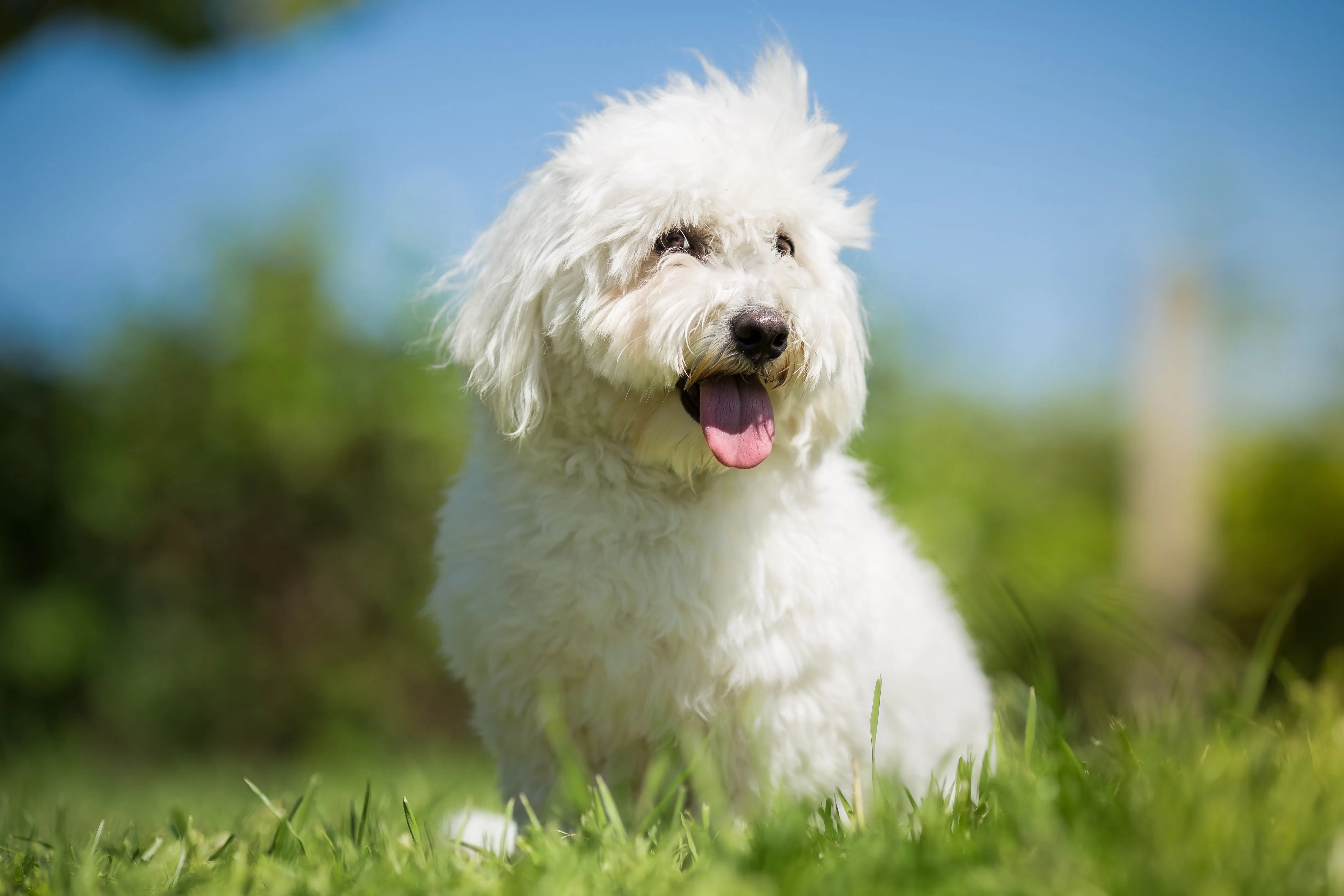 A white Coton de Tulear with its characteristic fluffy, cotton-like coatThe Coton de Tulear, originating from Madagascar, is a small breed with a soft, cotton-like coat that sheds minimally. This makes them a good option for allergy sufferers. They are known for their cheerful disposition, making them excellent companions for families and individuals alike. Cotons are easygoing and generally get along well with children and other pets. Regular grooming is essential to keep their unique coat tangle-free.
A white Coton de Tulear with its characteristic fluffy, cotton-like coatThe Coton de Tulear, originating from Madagascar, is a small breed with a soft, cotton-like coat that sheds minimally. This makes them a good option for allergy sufferers. They are known for their cheerful disposition, making them excellent companions for families and individuals alike. Cotons are easygoing and generally get along well with children and other pets. Regular grooming is essential to keep their unique coat tangle-free.
8. Affenpinscher
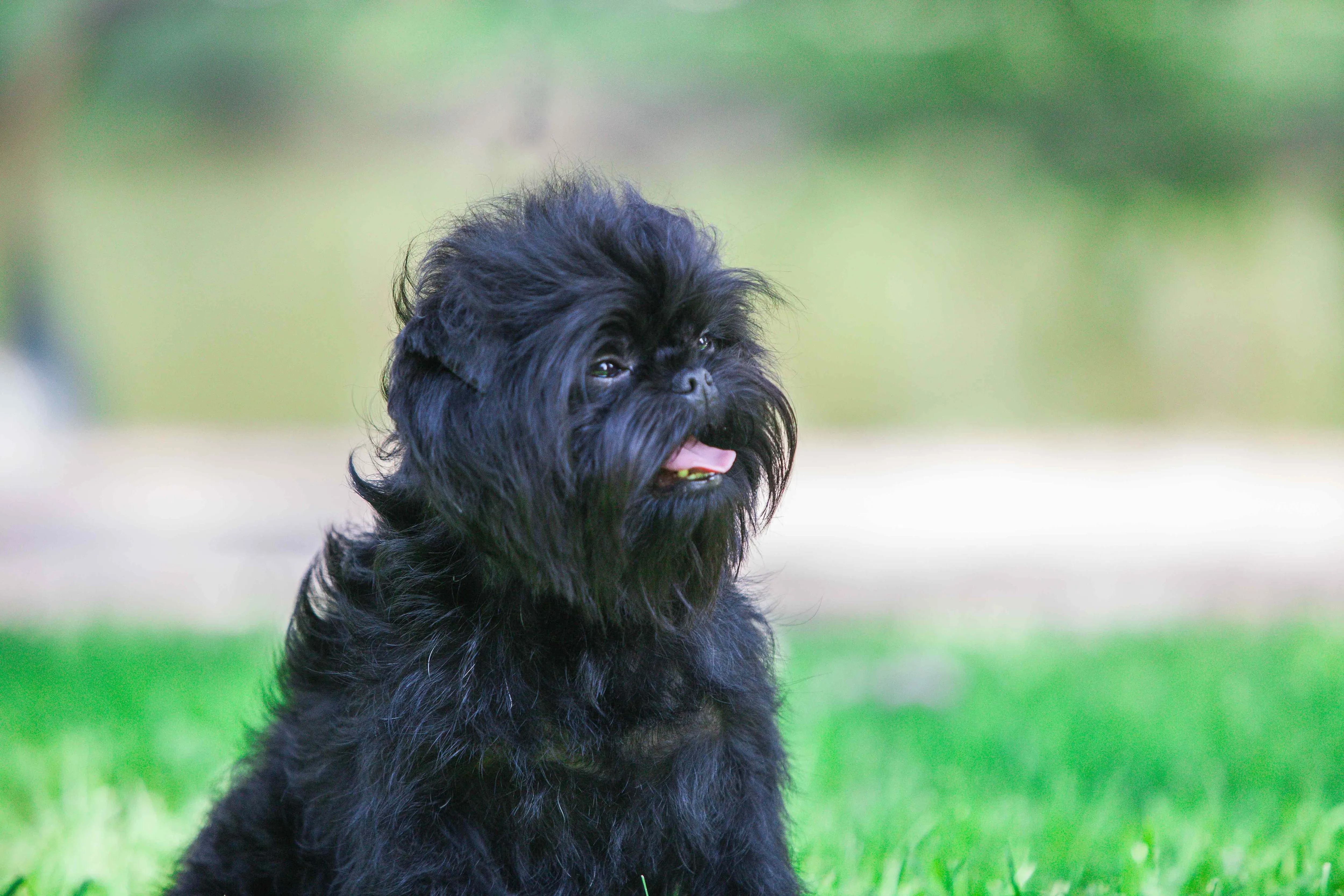 A close-up of an Affenpinscher with its distinctive wiry coatThe Affenpinscher, often described as “monkey-like,” is a small terrier breed with a dense, wiry coat that produces fewer allergens. While they do shed, it’s significantly less than many other breeds. This breed is known for its curious and lively personality. Their coat requires regular brushing and occasional hand-stripping to maintain its texture and appearance.
A close-up of an Affenpinscher with its distinctive wiry coatThe Affenpinscher, often described as “monkey-like,” is a small terrier breed with a dense, wiry coat that produces fewer allergens. While they do shed, it’s significantly less than many other breeds. This breed is known for its curious and lively personality. Their coat requires regular brushing and occasional hand-stripping to maintain its texture and appearance.
9. Shih-Poo
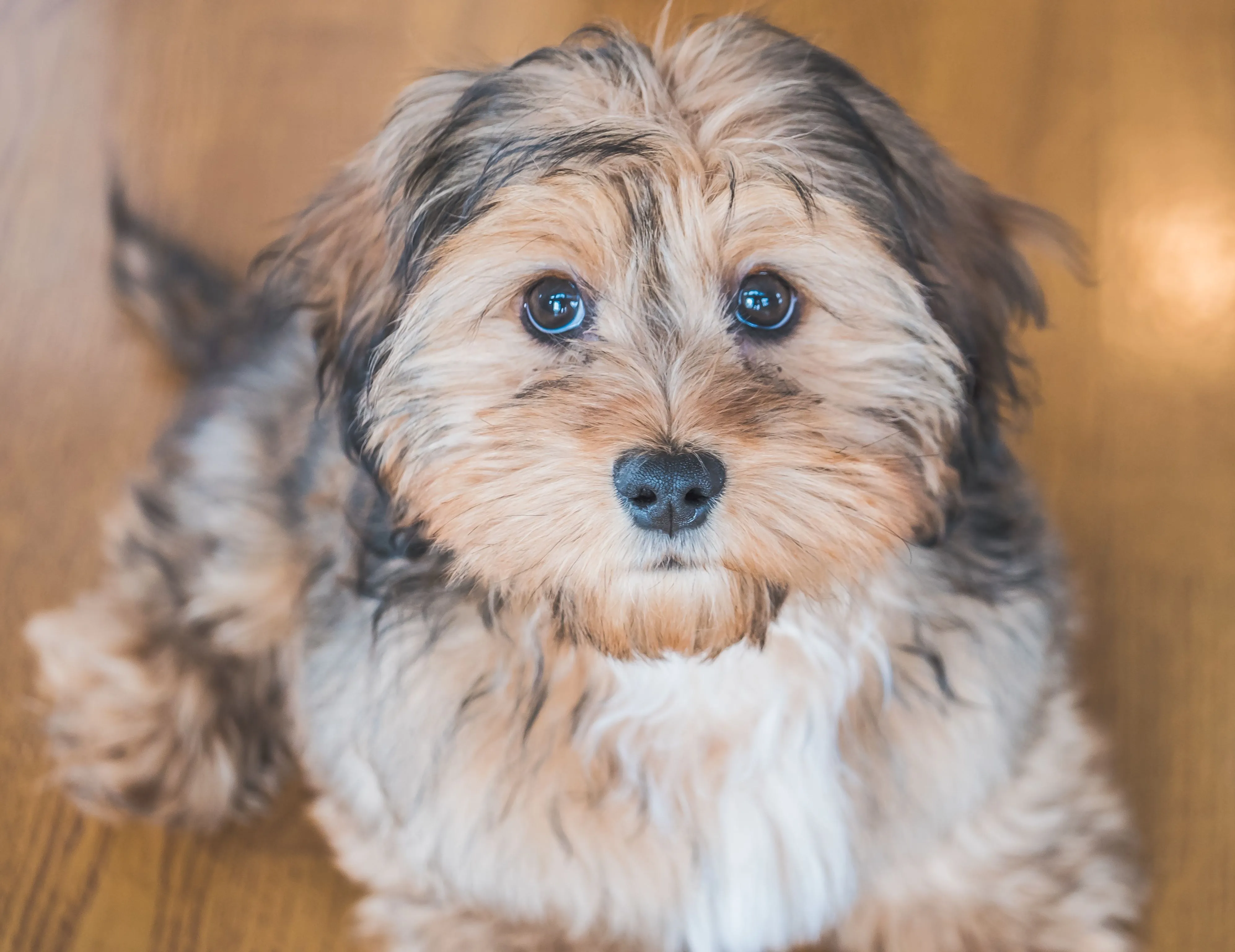 A close-up of a Shih-Poo with a curly, non-shedding coatA delightful crossbreed between a Shih Tzu and a Poodle, the Shih-Poo inherits the hypoallergenic qualities of both parent breeds. This small dog typically has a curly or wavy coat that sheds very little. Shih-Poos are known for being affectionate, playful, and adaptable, making them excellent companions for various households. Regular grooming is essential to keep their coat healthy and tangle-free.
A close-up of a Shih-Poo with a curly, non-shedding coatA delightful crossbreed between a Shih Tzu and a Poodle, the Shih-Poo inherits the hypoallergenic qualities of both parent breeds. This small dog typically has a curly or wavy coat that sheds very little. Shih-Poos are known for being affectionate, playful, and adaptable, making them excellent companions for various households. Regular grooming is essential to keep their coat healthy and tangle-free.
10. Malshi
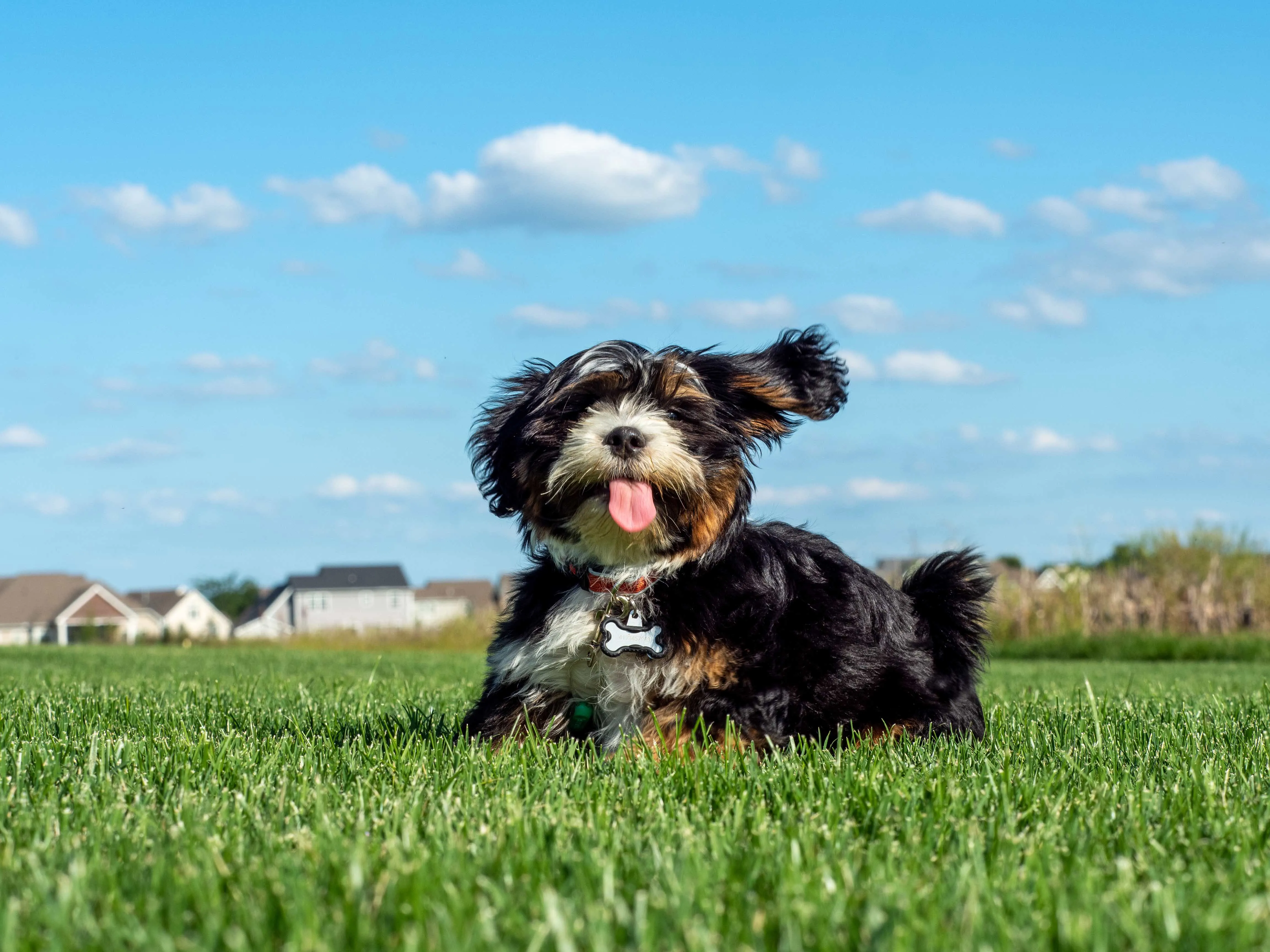 A tricolor Malshi sitting happily in green grassThe Malshi is a charming crossbreed of the Maltese and the Shih Tzu, combining the best of both low-shedding, hypoallergenic breeds. These small dogs are known for their happy and affectionate nature, thriving on close companionship. Their coat requires regular grooming to prevent matting and maintain its cleanliness.
A tricolor Malshi sitting happily in green grassThe Malshi is a charming crossbreed of the Maltese and the Shih Tzu, combining the best of both low-shedding, hypoallergenic breeds. These small dogs are known for their happy and affectionate nature, thriving on close companionship. Their coat requires regular grooming to prevent matting and maintain its cleanliness.
11. Shorkie
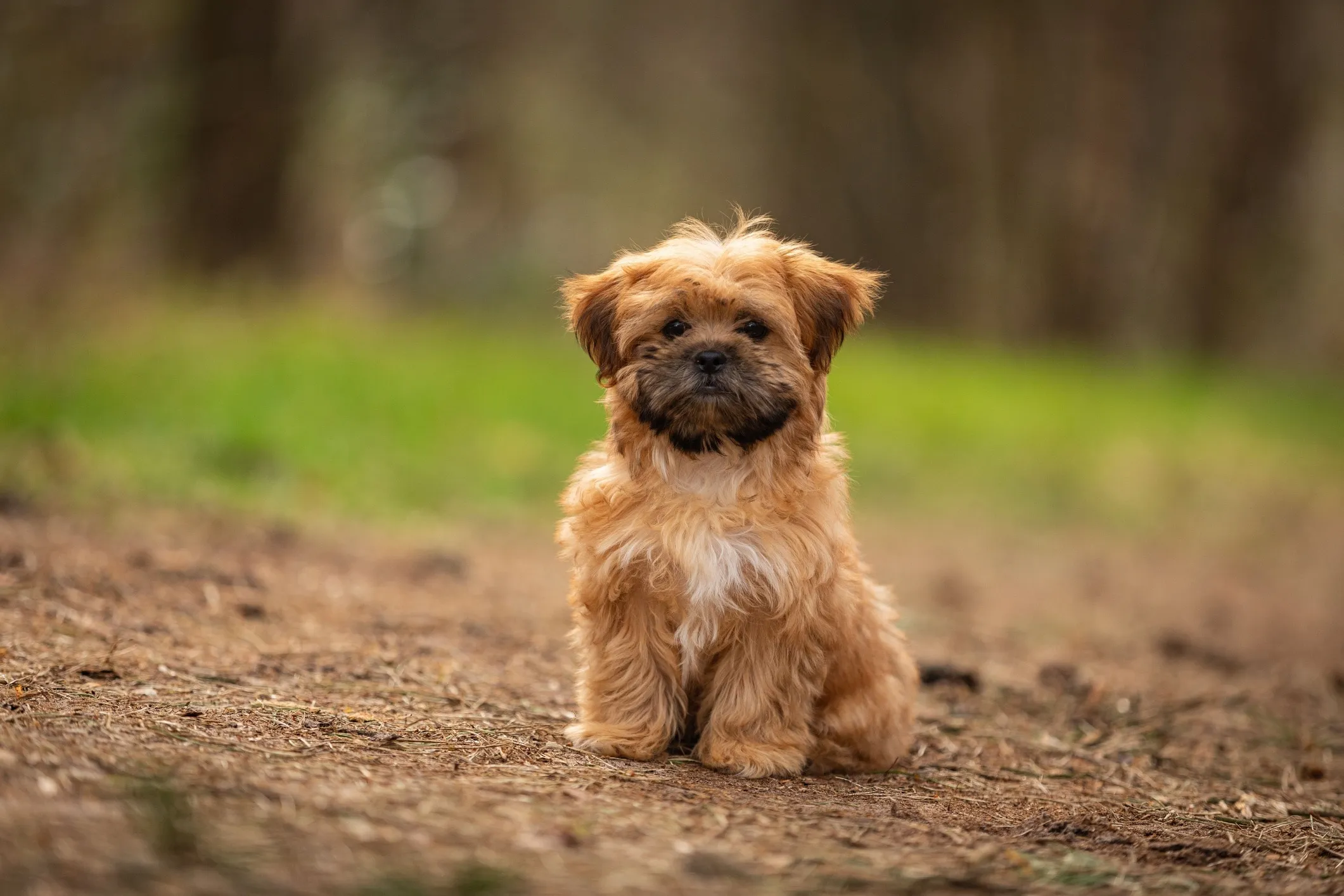 A tan and black Shorkie sitting on a hiking trailA popular crossbreed between a Shih Tzu and a Yorkshire Terrier, the Shorkie is a small, energetic, and friendly dog that is generally considered hypoallergenic due to its minimal shedding. They possess a charming mix of traits from both parent breeds. Like many small breeds with long hair, consistent grooming is key to keeping their coat in good condition.
A tan and black Shorkie sitting on a hiking trailA popular crossbreed between a Shih Tzu and a Yorkshire Terrier, the Shorkie is a small, energetic, and friendly dog that is generally considered hypoallergenic due to its minimal shedding. They possess a charming mix of traits from both parent breeds. Like many small breeds with long hair, consistent grooming is key to keeping their coat in good condition.
Essential Tips for Living with a Hypoallergenic Dog
Welcoming a small, non-shedding, hypoallergenic dog into your home is exciting, but it also requires a commitment to specific care practices to maximize allergen control.
Consistent Grooming is Key
Despite their low-shedding nature, these breeds still require diligent grooming. Regular brushing, ideally daily, helps prevent matting and distributes natural oils throughout the coat. Bathing every four to six weeks with a gentle dog shampoo can help remove allergens from the skin and coat. Some owners find specialized shampoos designed to reduce dander particularly helpful. Professional grooming appointments every 4-8 weeks are often necessary for breeds with continuously growing hair, involving trimming, clipping, and brushing.
Maintain a Clean Home Environment
Minimizing allergens extends beyond your dog’s grooming routine. Regular cleaning of your home is crucial.
- Vacuum frequently: Use a vacuum cleaner with a HEPA filter to capture fine dander particles.
- Dust regularly: Damp dusting helps trap airborne allergens.
- Wash bedding often: Wash your dog’s bedding, as well as your own, in hot water weekly.
- Consider air purifiers: High-efficiency particulate air (HEPA) filters in air purifiers can significantly reduce allergens in the air.
- Ensure good ventilation: Open windows when possible to circulate fresh air.
Consult with Your Doctor About Allergy Management
If you have dog allergies, consulting with your healthcare provider is paramount. They can offer personalized advice and discuss various management strategies, including:
- Medications: Antihistamines, decongestants, or nasal sprays can help manage symptoms.
- Allergy shots (immunotherapy): In some cases, this can help desensitize your body to allergens over time.
- Lifestyle adjustments: Your doctor can advise on how to minimize exposure to allergens in your daily life.
It’s important to remember that even with a hypoallergenic breed, avoiding direct contact with a dog’s saliva or urine can still be beneficial, as these can also be triggers for allergic reactions.
Conclusion
Choosing a small dog that doesn’t shed and is hypoallergenic can open the door to the joys of dog ownership for many individuals and families who previously thought it impossible. While no dog is truly allergen-free, breeds like the Poodle (Toy and Miniature), Yorkshire Terrier, Shih Tzu, Bichon Frise, and Maltese offer a significantly reduced allergen profile. By understanding their specific grooming needs and maintaining a clean living environment, you can create a harmonious home for both you and your new canine companion. Remember to always consult with a healthcare professional regarding allergy management to ensure the best possible experience for everyone. If you’re interested in other breeds, explore our guide on small size dogs that don’t shed for more options.
References
- National Institute of Environmental Health Sciences. (n.d.). Allergens: Pets. Retrieved from https://www.niehs.nih.gov/health/topics/agents/allergens/pets/index.cfm
- PetMD. (n.d.). Hypoallergenic Dogs. Retrieved from https://www.petmd.com/dog/general-health/hypoallergenic-dogs
